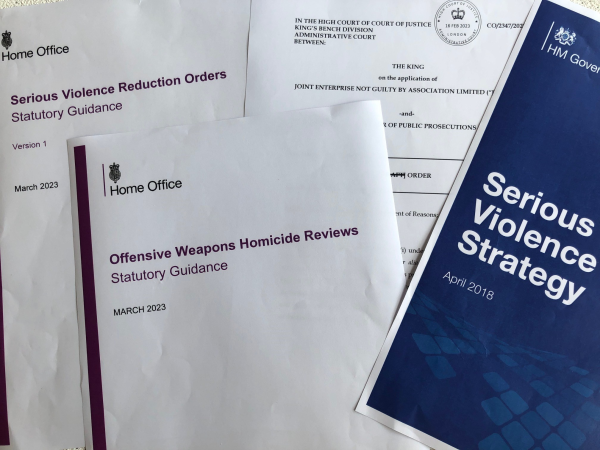
The roll out of a government pilot scheme to tackle knife crime has been shrouded in unjustified secrecy, according to a publication released today by the Centre for Crime and Justice Studies in collaboration with StopWatch.
Serious Violence Reduction Orders (SVROs), a new civil order permitting the suspicion-less stop and searching of individuals convicted of certain knife and weapon related offences, were introduced as a pilot in April 2023 by the previous Conservative government.
Today’s briefing highlights significant concerns about the pilot in operation for this expansive police power.
While intended to reduce serious violence, the briefing reveals:
- Lack of transparency: Despite being a pilot scheme, the SVRO rollout has been marked by restricted access to crucial information about the use of the orders to date. The Home Office and police cite the need for a ‘safe space’ for policymaking as the rationale for not releasing basic information about the pilot thus far.
- Few searches conducted: With limited information from the pilot, researchers identified through annual stop and search figures, data that showed only 66 searches took place under SVRO powers in the first year of the pilot - significantly fewer than the 1,800 searches anticipated by the Home Office. None of these searches led to the discovery of weapons. The vast majority of these searches took place in one pilot area (Merseyside). It is unclear how many people these searches relate to.
- Disappointing progress: The speed at which civil orders like the SVRO have emerged contrasts with the slow pace at which evidenced-based measures to reduce serious violence have been adopted. Place-based investment, interventions for individuals affected by violence, and tackling damaged trust in policing require greater prioritisation if the government is to make progress regarding its ambitious target to halve knife crime over a decade.
The briefing stresses the urgency of the government shifting focus. It concludes:
The fundamental policy choice facing the government on reducing serious violence is clear. Does it develop stronger strategic programmes, based on the well-established evidence, and deliver the reductions in violence we all wish to see. Or does it continue with measures that, while giving the impression of being decisive, ultimately fall very short.
Helen Mills, Head of Programmes at the Centre for Crime and Justice Studies and co-author of the briefing, said:
We’ve always been sceptical about this power and how it will work. The relatively few searches to date seems to confirm that. Violence reduction is too important an ambition for governments not to match the attention-grabbing claims with which new powers are introduced with transparency about what actually happens next.
Habib Kadiri, the Executive Director of Stopwatch, who collaborated with the Centre in this work said:
In exercising powers that appear to do more harm than good to marginalised communities, the police risk damaging their already poor public reputation even further.
SVROs inherently lack transparency, efficacy, and accountability. The power should be repealed. Doing this would demonstrate this administration's commitment to streamlining a bloated criminal justice legislature in favour of fairer and more effective ways of policing.
Leroy Logan, chair of Transition to Adulthood Alliance at the Barrow Cadbury Trust and former Metropolitan Police Superintendent said:
For many years the police have fooled themselves into the notion they can arrest and /or stop and search their way towards solving the issues of community violence. If that was the case, these issues would have been solved many years ago. Despite these flaws in their thinking, police have doubled down by bringing in even more draconian enforcement tactics, with less transparency and accountability; in fact they continuously gaslight critical friends and the wider public that their tactics are necessary and proportionate. For example, suspicion-less stop and search is tantamount to bringing back the pre PACE ‘Sus Law’ 2.0, thus bringing back policing to a 1970s model. The public won’t stand for it, and I hope the new Home Secretary won’t either!
Labour, when in opposition, voiced concerns about SVROs, including the need for transparency and learning lessons not to be restricted to the Home Office commission evaluation, which is not anticipated until around late 2025, over two and half years on from the SVROs introduction. In 2022, Sarah Jones MP, then shadow Home Office minister, said:
We do not believe [the Government’s plan] goes far enough to address our concerns. We fear that SVROs might be similar to knife crime prevention orders, which were hailed several years ago as the answer to violence, but have not yet been introduced, probably because it is hard to make them work. Good policing and prevention is key, and the government should focus their attention on that.
The Centre for Crime and Justice Studies and StopWatch are now calling on the government to prioritise transparency by publishing an update on the SVRO pilot, and commit to releasing a full evaluation of SVROs in due course.
We are grateful to the Transition to Adulthood Alliance, convened by the Barrow Cadbury Trust for supporting this work.